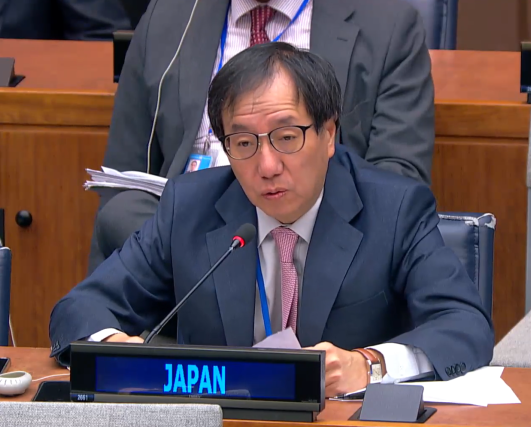安保理改革に関する政府間交渉(IGN)における山﨑大使ステートメント
令和6年2月16日

(As delivered)
Thank you, Co-Chairs.
I deliver this statement on behalf of the G4 – Brazil, Germany, India, and my own, Japan.
Our overall position on the five clusters was articulated by my Brazilian colleague during the IGN session held in December last year, and is clearly presented in the G4 model. We look forward to a constructive and fruitful discussion on our model at the next session in early March.
The guiding questions posed by the Co-Chairs for today concern: a) mandating a review clause; and b) special mechanics of nomination and rotation for cross-regional groups and countries in special circumstances.
First, regarding mandating a review clause, the G4 proposes in its model that:
“The situation created by the amendments to the Charter would be reviewed fifteen years after their entry into force.”
We believe it necessary and natural that a huge transformation of a powerful institution such as the UN Security Council certainly requires periodic maintenance with necessary adjustments, so that it can function better and fulfill its mandate. In this sense, it is quite unusual that there has been no review during the roughly 60 years since the last reform which saw the addition of four non-permanent members, let alone the almost 80 years since the creation of the Council with five permanent members. Everyone knows that the current structure of the Council does not reflect contemporary realities.
The review we propose will certainly be a good opportunity that may lead to a deep, substantial discussion and rigorous assessment on important topics such as: how expanded seats with better regional representation have affected the decision-making process of the Council and its working methods; and how we should treat the veto of new permanent members. We are also curious about how the reviews proposed by Liechtenstein and L69 would work, and why other countries think there is no need for a review.
Second, regarding cross-regional groups and countries in special circumstances, the G4 model proposes:
“Member States should give due consideration during the nomination and election of non-permanent members to adequate and continuing representation of small and medium size Member States, including Small Island Developing States (SIDS). Member States should also make full use of the possibility of cross-regional arrangements to ensure that the diversity of the General Assembly membership is adequately reflected in the Council.”
As you can see, the G4 recognizes the importance of better representation beyond the existing regional groups, and is open to further concrete discussions. We appreciate that the current practice of rotation of one non-permanent seat between Arab and non-Arab countries within the Asia-Pacific Group has been working well. As a basis for discussion, we should be also reminded of Article 23 (1) of the UN Charter, which stipulates that: non-permanent members should be elected with due regard being specially paid primarily to candidates’ contribution to the maintenance of international peace and security, and secondarily to equitable geographical distribution.
To move the discussion from the abstract to the concrete, it would be useful for the Member States to first identify and define which specific groups or countries deserve special consideration in this regard, then carefully listen to their voices.
We look forward to a deeper exchange of views today, and will continue our active participation in these discussions as they proceed.
Thank you, Co-Chairs.
